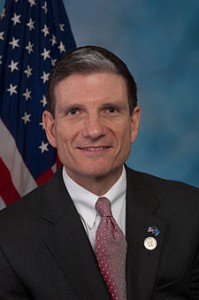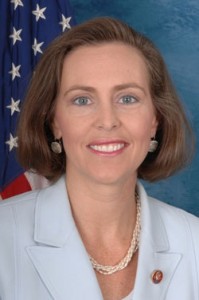Bipartisan legislation creates federal grant program for states to fund residency programs
(Greg Lemon) – As representatives serving states with severe doctor shortages that cause access to care issues for patients, Congressman Joe Heck (NV-03) and Congresswoman Kathy Castor (FL-14) introduced bipartisan legislation to address those shortages.
The legislation, called the Creating Access to Residency Education – or CARE – Act, creates a federal grant program for states to create new residency programs or increase slots in existing ones. According to a 2013 study by the Association of American Medical Colleges (AAMC), 47.4% of physicians nationwide stay or return to practice where they completed their residency. Therefore, expanding residency programs or increasing slots in existing programs is critical to addressing access to care gaps for states like Nevada and Florida.
 “Addressing doctor shortages in states like Nevada and Florida is one of our most critical public health challenges,” Rep. Joe Heck said. “We know physicians are significantly more likely to stay and practice medicine where they complete their residency program. Therefore, increasing federal grant opportunities so states can expand current residency programs or create new ones will help under-served states train and retain new doctors. I look forward to working with Congresswoman Castor to move this important bill forward to increase access to healthcare and improve public health.”
“Addressing doctor shortages in states like Nevada and Florida is one of our most critical public health challenges,” Rep. Joe Heck said. “We know physicians are significantly more likely to stay and practice medicine where they complete their residency program. Therefore, increasing federal grant opportunities so states can expand current residency programs or create new ones will help under-served states train and retain new doctors. I look forward to working with Congresswoman Castor to move this important bill forward to increase access to healthcare and improve public health.”
 “While Florida’s medical schools are graduating more doctors, there are not enough doctors training in our hospitals and clinics,” U.S. Rep. Castor said. “Doctors most often practice where they train, not where they attend medical school. Florida needs more residency slots, otherwise the state will pay to educate but will not retain the next generation of doctors.”
“While Florida’s medical schools are graduating more doctors, there are not enough doctors training in our hospitals and clinics,” U.S. Rep. Castor said. “Doctors most often practice where they train, not where they attend medical school. Florida needs more residency slots, otherwise the state will pay to educate but will not retain the next generation of doctors.”
The CARE Act establishes a $25 million grant initiative administered by The Centers for Medicare & Medicaid Services (CMS) which is open to teaching hospitals and accredited graduate medical education training programs in states with fewer than 25 medical residents per population of 100,000.
It allows the states to create new residency programs or increase slots in existing ones. Grant awards range from two-thirds of the cost of funding a primary care slot to one-half the cost for positions in other fields. The legislation also encourages teaching hospitals to partner with other organizations, such as local governments, community health centers or local health departments to assist with funding their portion of the cost.
SUPPORT FOR THE CARE ACT:
“The American Medical Association has long-advocated for increasing the number of medical residency slots to train physicians in needed specialties and regions to improve access to health care. We believe that the CARE Act would be a significant step toward ensuring patient access to care through its creative solutions to fund new medical residency positions. We look forward to working with Representatives Castor and Heck to urge support for this important bill that would help address physician shortages in undersupplied specialties and underserved areas.” – Robert M. Wah, M.D, President, American Medical Association
“AACOM is pleased to offer its support for this vital legislation, which aims to increase patient access to health care by supporting the development or expansion of graduate medical education partnerships in states across the country, with special consideration for those with a low ratio of medical residents relative to the population as a whole. The Creating Access to Residency Education (CARE) Act will help ensure the stability and continuity of the nation’s medical residency training programs that produce future physicians as well as the hospitals and health centers that provide care to U.S. citizens. AACOM commends Representatives Castor and Heck for their leadership on this timely and increasingly important issue.” – Stephen C. Shannon, DO, MPH, President and CEO, American Association of Colleges of Osteopathic Medicine
“As the dean of a medical school, president of a state medical society, educator and practicing physician with a vested interest in the health care of Nevada, I support the CARE Act in its creative attempt to expand graduate medical education in states with health care access problems and insufficient medical residents per 100 thousand population.” – Mitchell D. Forman, D.O., MACP, Dean and Professor, Touro University Nevada College of Osteopathic Medicine and President, Nevada State Medical Association.
NEVADA INFORMATION
An April 2014 Vegas Inc. article pointed out the severity of Nevada’s doctor shortage problem.
“The Silver State, as measured by the number of physicians for every 100,000 residents, is severely short on both generalists and specialists, including family practice doctors (46th lowest rate in the country), pediatricians (46th), orthopedic surgeons (51st), ophthalmologists (48th), psychiatric physicians (50th), OB-GYNs (40th) and registered nurses (50th), according to University of Nevada School of Medicine researchers.
“Nevada’s highest-ranked fields include anesthesiology (21st in the country) and plastic surgery (27th).”
Congressman Joe Heck represents Nevada’s Third Congressional District in the House of Representatives. He serves on the House Armed Services Committee, the House Permanent Select Committee on Intelligence, and the House Committee on Education and the Workforce.




Facebook
Twitter
Pinterest
RSS